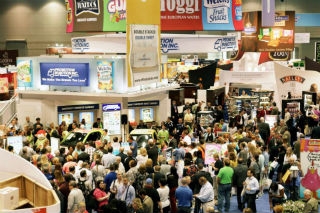CEIR Index Report: Trade Show Industry Growth Streak Continues for 12th Consecutive Quarter

The Center for Exhibition Industry Research’s latest Index Report for the second quarter was just released, and the good news is for the 12th consecutive quarter, the trade show industry continues to grow, though that growth has slowed.
Year-over-year growth increased 1.2 percent overall, which is down slightly, 0.3 percent, compared with the second quarter of last year.
The growth also lagged behind that of the GDP numbers in the second quarter that saw a 1.4 percent increase.
"Overall, the second-quarter results continue on a positive upswing, and they confirm that the exhibition industry has effectively weathered the recession and is a valuable business practice, despite ongoing uncertainty from lawmakers in Washington," said CEIR’s economist Allen Shaw, Ph.D., chief economist for Global Economic Consulting Associates.
Sequestration and cutbacks in government attendance at shows resulted in a 10-percent decline in Government sector shows’ overall metrics in the second quarter of 2013.
On the other hand, there were several other sectors that saw positive numbers, such as Professional Business Services, increasing 3.9 percent, Raw Materials and Science, increasing 3.9 percent, and Food, increasing 3.4 percent.
One of the food shows that saw good numbers was the National Confectioners Association’s Sweets & Snacks Expo, held May 21-23 at Chicago’s McCormick Place.
The show not only snagged a 10-percent increase in attendees, but also the number of new exhibitors rose 17 percent and the showfloor grew 9 percent, compared with the 2012 event.
According to CEIR economists, the biggest surprise was with the Building, Construction, Home and Repair sector, which declined by 1.8 percent, even though real estate construction had a strong rebound during the same period.
The CEIR Index measures year-over-year changes in four key metrics to determine overall performance: Net Square Feet of Exhibit Space Sold; Professional Attendance; Number of Exhibiting Companies; and Gross Revenue.
The strongest metric in the second quarter was Professional Attendance, which jumped 3.9 percent, the biggest gain since the first quarter of 2012. This increase was a percentage point higher than the 2.9 percent increase last year.
Real Revenues showed a slight increase as well, 1.4 percent, but were down, compared with 2.0 percent during the same time in 2012.
Net Square Feet was flat this quarter and down from a 1.0 increase in the second quarter of last year.
Finally, Exhibitors declined by 0.5 percent, compared with a 0.1 percent increase that was seen during the same time last year.
As for future growth, CEIR predicts this year will remain flat and 2014 will pick up momentum again.


Add new comment